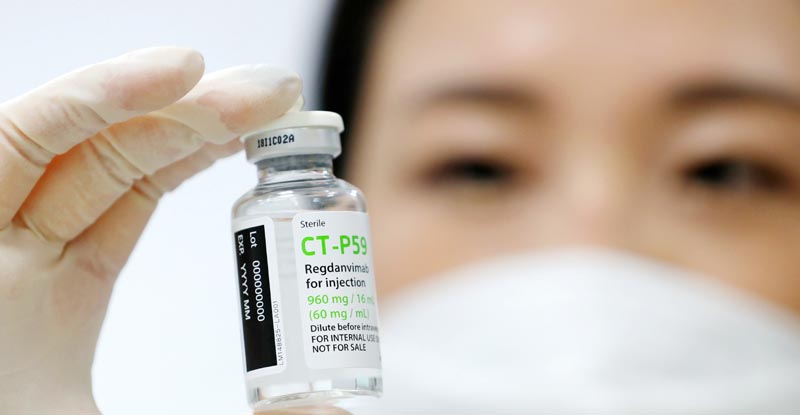 |
|
| ▲ Celltrion believes that the self-developed novel coronavirus infection (Corona 19) antibody treatment “Rekironaju” (ingredient name regdanvimab, code name CT-P59) shortens the recovery period of patients and lowers the incidence of severe symptoms as a result of phase 2 clinical trials. Said that it appeared. | |
| Ⓒ Yonhap News |
View related photos |
As the results of phase 2 clinical trials of’Rekironaju’ (code name: CT-P59), a corona 19 antibody treatment drug made by a domestic pharmaceutical company Celltrion, are announced, interest is drawing on whether a new phase in the treatment of Corona 19 will arrive. Prudence and pessimism still coexist with positivity. However, on the basis of the affirmation, there is a successful quarantine situation and excellent medical system in Korea.
According to the results of Phase 2 clinical trial announced by Celltrion on the 13th, Rekironaju (based on 40mg/kg dose) reduced the incidence of severe patients requiring inpatient treatment by 54% for all patients and 68% for moderately ill patients over 50 years old. Made it. In addition, the time to clinical recovery from the disappearance of Corona 19 symptoms was 8.8 days in the placebo group, while only 5.4 days in the Rekirona injection group. In the case of moderate or moderately ill patients over 50 years of age receiving the treatment, the recovery time was shortened by more than 5-6 days compared to the placebo group.
The prudence is basically based on the fact that sufficient clinical trials have not yet been performed. There were 307 people who participated in phase 2 clinical trials. Jeong Ki-seok, a professor at Hallym University (former head of the Centers for Disease Control and Prevention) said, “I can only say that’there is a tendency to get better’ only with the current data, and I am not sure how much it works for sure.” “We have to look at more cases.”
The biggest reason for pessimism is that the US has already made an antibody treatment and approved it for emergency use by domestic pharmaceutical companies Lily and Regeneron, respectively, but they are not showing a great effect in controlling the spread of Corona 19. Celltrion’s Rekironaju is also an antibody treatment in the same way.
However, experts note that the situation in the US and Korea is different.
Lee Jae-gap, professor of infectious medicine at Hallym University’s Gangnam Sacred Heart Hospital, pointed out that “antibody therapy should be administered through (intravenous) injection for 90 minutes, but there is no room for injection in the outpatient clinic, so accessibility is inevitable. Professor Lee said, “Especially in the case of the United States, patients with mild or moderate corona19 cannot be admitted to the hospital, so it is difficult to use.”
In fact, on December 19, last year, ABC News reported that 250,000 antibody treatments were supplied to each state in the United States, but only 5-20% of them were used. In the United States, hospitalization for treatment is difficult due to the explosion of patients, and the fact that patients do not actively ask for treatment is considered to be the cause of poor use.
However, in Korea, the situation and medical system are basically different. Professor Lee said, “Once in Korea, there are many inpatient treatments, and there are many early diagnoses, so the treatment can be effective,” said Professor Lee. “I doubt whether an injection can be given at the life treatment center, but all mild patients need treatment. Because it is not, I think it can be used in a hospital dedicated to infectious diseases.”
Jeong Jae-hoon, a professor in the Department of Preventive Medicine, Gachon University College of Medicine, said, “Overseas, the value of antibody treatments is not high.” Prof. Jeong said, “The number of study subjects is still insufficient and a separate effect evaluation is required for those with mild cases.” It was confirmed that “the effect of reducing hospital stay, hospitalization, and oxygen treatment needs in patients over 50 years of age with pneumonia. This means that if antibody therapy is used properly, the burden on the medical system can be reduced.”
Professor Hong Yoon-cheol of the Department of Preventive Medicine at Seoul National University said, “Looking at the presentation of phase 2 clinical trials for Rekkirona, it seems to have produced excellent results as a treatment.” “Compared to Remdesivir (which was the first in the world to be approved as a COVID-19 treatment), he said. Explained. Professor Hong said, “The biggest problem with the medical system right now is the’number of critically ill beds.’ Then, administering the treatment to mild and moderately ill patients in hospitals can ultimately reduce the number of severely ill patients. “It can be reduced.”
